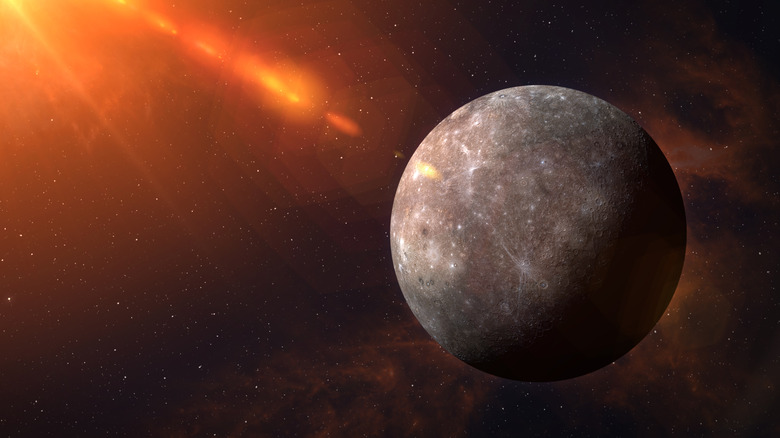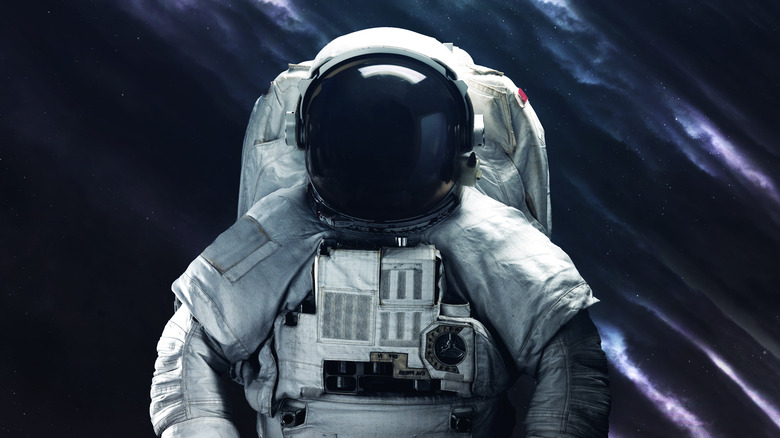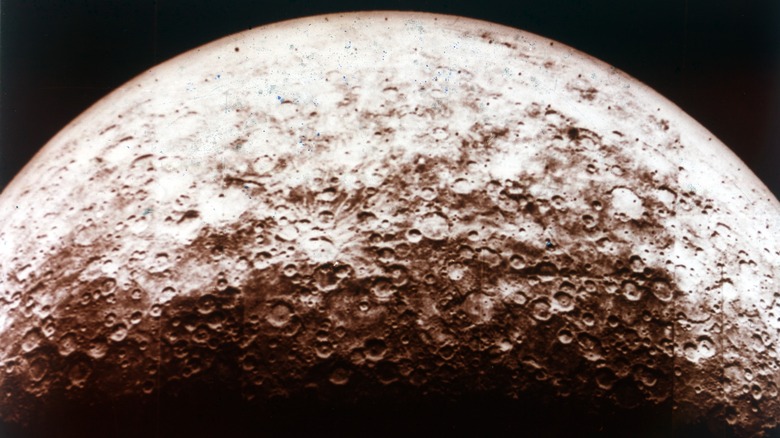This Might Happen To Your Body If You Land On Mercury
Mercury is the smallest planet in our solar system and the closest one to the sun. Size-wise, it's about as big as our Moon and just as gray and rocky. If you were to go for a walk on Mercury, you'd notice lots of craters and impact basins, the result of asteroids knocking into the planet's surface over thousands and thousands of years. It would be a tricky walk, too; NASA explains that the planet is filled with cliffs, some a mile high.
Despite the dry, desolated landscape, Mercury does have one great thing to offer: stunning sunrises and sunsets. As a result of the fast orbital spinning and Mercury's stretched-out orbit, the planet can sometimes have more than one sunset or sunrise happening at the same time. So if you're standing on Mercury, the sun will appear to rise, set, and rise again over the horizon (also per NASA).
No astronauts have set foot on Mercury, but two spacecraft have traveled there, with a third scheduled to arrive in 2025. Because of its proximity to the sun, even the Hubble Space Telescope has trouble pointing directly at Mercury, according to Britannica. To see Mercury, astronomers have a very small window around sunrise or sunset. Its tricky position and small size mean that Mercury is the least-explored planet in our Solar System. We don't know much about it, except that it's not very ideal for keeping things alive — at least, not life as we know it.
A lot of things can kill you on Mercury
Your chances of getting out alive are pretty slim if you land on Mercury. For starters, it's always either too hot or too cold here, and no matter which option you choose, it'll take about two seconds for you to be ... well, dead. While an Earth day is 24 hours long, a day on Mercury lasts 1,408 hours. That's a lot of sunlight hours on a planet where the temperature reaches 800 degrees Fahrenheit. On the other hand, when the planet is facing away from the sun during its rotation, temperatures will drop to -290 degrees Fahrenheit (via NASA).
Mercury has a tenuous atmosphere known as an exosphere. A mix of many elements like sodium, magnesium, hydrogen, and helium, Mercury's exosphere is created when solar weather (including heavy winds) hits the planet's surface and sends particles flying into the air. The result is a thin layer that offers little protection from the sun. Worse, you'd suffocate if you try to breathe it (per NASA).
If you're still alive at this point, then there's also solar radiation to consider. According to research published in the American Geophysical Union Journal, Mercury receives up to 11 times the solar radiation we experience on Earth. This is a challenge even for satellites and computers, so it would definitely not be fun for humans. In fact, NASA points out that space radiation is the biggest threat to astronauts, damaging DNA, potentially causing cancer, and yes, eventually killing you.
Then again, Mercury is also kind of a cool planet
If you happen to survive all the potential horror-film deaths Mercury has to offer, landing there for a while could be kind of fun. For starters, since Mercury is smaller than Earth, there's less surface gravity — just 38 % of the gravity of our planet, according to Cool Cosmos. That means that if your weight on planet Earth is 150 lbs, you would only weigh 57 lbs on Mercury. Weighing less has some cool advantages. For example, if you were going to try to jump straight up, you would easily go up about 4 feet up in the air in Mercury, according to the Online Star Register.
Mercury's days are very long, but its year is very short. Earth needs 365 days to orbit around the sun, but Mercury can do it in just 88 days. This is the shortest time of any planet, according to Britannica. Because of this, it's a new year every 88 days on Mercury, and you would be a lot older (by Mercurian standards, anyway) if you lived there. For example, if you were born in March 1991, you would be 30 years old on Earth but 125 on Mercury. Plus, your next birthday would be in July and then again in November of the same year (via Exploratorium).


